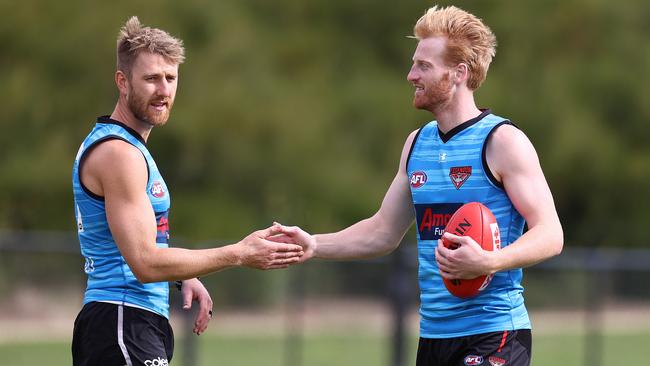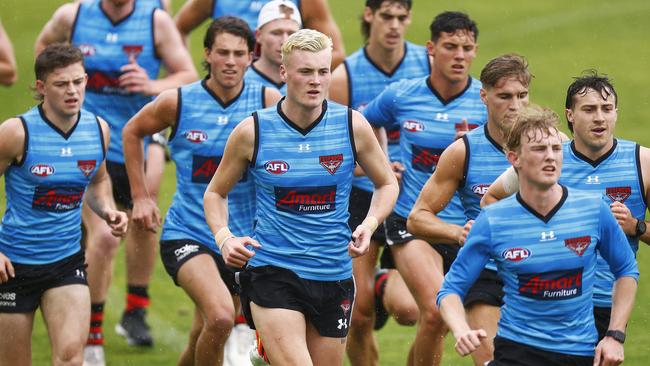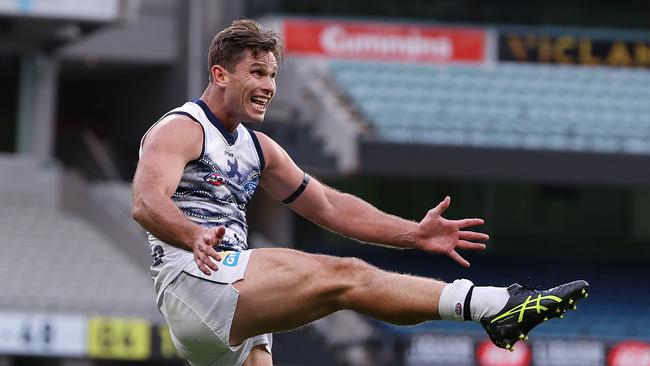AFL 2022: How clubs are navigating Covid-19 wave
From heart tests to asking players to bring their own water bottles to training, AFL teams have implemented measures to dodge an Omicron disaster. See what your club is doing.

AFL News
Don't miss out on the headlines from AFL News. Followed categories will be added to My News.
Electrocardiograms, outdoor meetings, personal drink bottles and daily rapid-antigen tests.
These are just some of the ways AFL clubs are navigating the hurdles of a third consecutive year with coronavirus.
The Omicron wave has led to a raft of players and staff across the clubs – aside from in Western Australia – entering Covid protocols, forcing the postponement of one women’s match last week due to a lack of available players, while men’s teams have trained in fewer numbers.
Essendon captain Dyson Heppell estimated 20 Bombers – players, coaches and staff – were unavailable on Monday because they were close contacts or had the virus.
Port Adelaide was missing about a quarter of its squad last week and it was reported that about 10 Sydney Swans tested positive before Christmas.
Stream every match of every round of the 2022 Toyota AFL Premiership Season Live & Ad-Break Free During Play on Kayo. New to Kayo? Try 14-days free now.

Clubs have been reluctant to confirm who has been affected but some players, such as Geelong’s Tom Hawkins and Hawthorn’s James Sicily, have revealed their positive diagnoses.
Apart from requiring teams to be double vaccinated to train and play, the AFL has not yet set protocols about what the men’s competition must do.
But clubs are bracing for similar ones to those introduced this month for the AFLW, including not attending indoor events with more than 100 people or large outdoor gatherings if social distancing is not possible.
Teams told News Corp that they had implemented their own measures to minimise the risk of contracting Covid and becoming close contacts.
Mask-wearing, sanitising and social distancing remain common practice, avoiding high-risk settings is expected, rapid-antigen tests are required daily to train, while other precautions are in place at clubs.
Port Adelaide is among those to introduce electrocardiogram testing for players who get the virus.

An ECG detects cardiac abnormalities by measuring electrical activity the heart generates.
The device is helping the Power monitor those affected before they ease back into training from being sidelined.
On the Gold Coast, the Suns are holding meetings outdoors and limiting time inside the football club in general. They have also asked players and coaches to make smart decisions in the community, like ordering takeaway and not visiting major shopping centres.
Players are bringing their own water bottles to Hawthorn trainings and the Hawks are eating meals outside.
The Crows have stopped crossover between their men’s, women’s and SANFL sides, separating the programs entirely in case of an outbreak.
Indoor training has been in rotating groups and players are being asked to have a commonsense approach when they go places, for example to dine outdoors.
Carlton is doing things in smaller groups where possible and Sydney has asked its personnel to minimise time spent with people they do not live with that are not from the club.
The Swans are also conducting things like training preparation and meetings at outside or remotely, where possible. Collingwood AFLW coach Steve Symonds said some of his club’s players and staff were “going above and beyond” by going to “near-on lockdown measures”, as well as giving rapid-antigen tests to immediate family to make sure they were not Covid-positive.
“A lot of our staff and players are isolating at home from contact from as many persons as they can,” Symonds said.
“They know that we’re in season now and they’re devoting their time and energies towards the game, towards the team and they want to be successful.
“It’s something that we haven’t driven inside our walls, they’ve just gone and done it because they’re so professional and devoted.”
Port Adelaide football manager Chris Davies said on Monday: “The last thing we want pre-season to turn into is a fiasco across the competition so the need is for our players to be mindful of what they’re doing.”
Priorities have not changed at league headquarters from the previous two seasons.
The AFL is committed to completing the women’s and men’s campaigns, awarding premierships in both, all while being guided by health officials.
Protocols brought in for the women’s competition this month will be reviewed ahead of round 3 this week.





